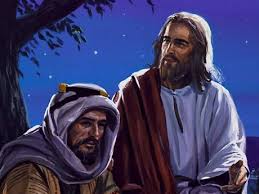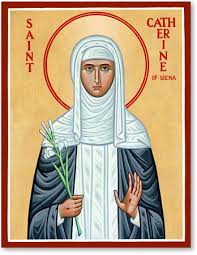HOMILY EASTER SEASON – WEEK 02 01
Living Our Baptismal Call in the Face of Opposition and Unbelief
Memorial of St. Catherine of Sienna
(Acts 4:23-31; Ps 2; Jn 3:1-8)
**********************************************************
“No one can enter the kingdom of God without being born of water and Spirit.”
These words of Jesus to Nicodemus, the secret, fearful disciple, invite us, I believe, to live out our baptismal calling, especially in the face of the world’s opposition.
 One had to hand it to Nicodemus – as a Pharisee he would have been well acquainted with the hostility of his colleagues towards Jesus, yet still summoned up the courage to meet with Jesus in a clandestine manner. Peter and John in the first reading, were also victims of that hostility. Psalm 2 reflects this centuries-old hostility in a more poetic manner: “Why do the nations conspire, and the peoples plot in vain? The kings of the earth set themselves and the rulers take counsel together, against the Lord and his anointed.”
One had to hand it to Nicodemus – as a Pharisee he would have been well acquainted with the hostility of his colleagues towards Jesus, yet still summoned up the courage to meet with Jesus in a clandestine manner. Peter and John in the first reading, were also victims of that hostility. Psalm 2 reflects this centuries-old hostility in a more poetic manner: “Why do the nations conspire, and the peoples plot in vain? The kings of the earth set themselves and the rulers take counsel together, against the Lord and his anointed.”
History reveals two levels of hostility – the first against God (unbelief) and the second against Jesus as the Messiah (misguided belief).
The resistance against God goes back to the very beginning of our salvation history, when our first parents succumbed to the temptation to decide for themselves what was right and wrong. That stubborn self-will, that lust to do whatever one feels like doing without any reference to an objective external source of authority or morality, has surfaced in one form or another ever since then.
Actually, past civilizations like the Napateans (300 BC – 300 AD) were much more spiritual and religious than our modern day self-proclaimed new atheists, as they had a highly developed religious life centered on sacrificial acts, even if they were based on a need to appease their gods. Today’s atheists proclaim there is no god, and blithely go on to fall for the false gods of possessions, fame and power, often imposing their values on others and ridiculing those who do believe in God “as they understand God.”
The second level of resistance is against the claim of Jesus to be the long-awaited Messiah, and comes mainly from the Jews, who refuse to believe that Jesus could possibly be the long-awaited Messiah. Those who do are known as messianic Jews, and the treatment they received from the Jewish religious establishment is very interestingly recounted in the book The Rabbi, the Secret Message and the Identity of the Messiah byCarl Gallups. That resistance is very understandable, as the fear of a whole belief system turned upside down that rocked St. Paul’s world would also rock the present system. It was this fear that forced Nicodemus to check Jesus out under the cover of night.
In the midst of that resistance, opposition and hostility, Jesus tells Nicodemus, who has come to believe Jesus is from God, that one cannot enter the kingdom of God unless they are born of water and the Spirit. What are we to make of that statement?
The Messiah had a two-fold mission – to redeem and to sanctify, to forgive and to heal. I think when we believe in Jesus as Son of God and Messiah, and come to him for forgiveness (the water) and healing (the Holy Spirit) we are giving him room to fulfill his role as the Messiah in our lives, and are thus reborn, divinized, transformed into Christ-likeness. Forgiven of all our sins (what we have done), we are free from all guilt and fear. Healed of all our sinfulness (what made us do it), our painful emotions like anger and resentment, our negative attitudes like false pride, stubborn self-will, lustfulness, jealousy, judgmentalism, etc., and even given power to overcome our addictions, we are freed from sadness, self-pity, shame and depression – we are experiencing the new life of Easter and are living in the kingdom of God already. We have “fallen upwards” in the words of Richard Rohr, and have “died before we die.”
St. Catherine of Siena, whom we honor today, was someone who truly understood this mystery and lived it in her life. One of four women doctors of the Church, she was born in Sienna, Italy in 1347, the youngest of 25 children. She vowed her virginity to God at the age of seven after a vision of Christ in glory. She then joined the Dominican Third Order in 1365 and spent those first years in seclusion, fasting and praying. In 1368 after receiving a vision of Christ accepting her as his bride, she felt called to carry this love to others, and so became more active, caring for the poor, tending to the sick, and corresponding with people from all walks of life, including princes and popes. In the process she became renowned as a peacemaker.
 Catherine was also a great mystic. Particularly famous are her visions of her exchanging hearts with Christ, and of the Virgin presenting her the Baby Jesus who gives her a ring. She expounded her doctrine in three works: the “Treatise on Divine Providence,” her “Letters” and a collection of “Prayers.” She died in Rome in 1380, was canonized in 1461, became patron of Italy in 1939, and was declared a doctor of the Church in 1970. She is co-patron of Europe with St. Bridget of Sweden and St Teresa Benedicta of the Cross. What an example she is for us.
Catherine was also a great mystic. Particularly famous are her visions of her exchanging hearts with Christ, and of the Virgin presenting her the Baby Jesus who gives her a ring. She expounded her doctrine in three works: the “Treatise on Divine Providence,” her “Letters” and a collection of “Prayers.” She died in Rome in 1380, was canonized in 1461, became patron of Italy in 1939, and was declared a doctor of the Church in 1970. She is co-patron of Europe with St. Bridget of Sweden and St Teresa Benedicta of the Cross. What an example she is for us.
The Eucharist is already a sharing in and foreshadowing of the heavenly banquet we aspired to share in fullness someday.
May our celebration strengthen our faith in Jesus as the Messiah, Son of God and Risen Lord, deepen our experience of living in the kingdom of heaven, and empower us to be a beacon of light to all who struggle to believe.




We should always strengthen our faith in Jesus Christ as the Messiah, son of God and risen Lord because we chose to follow him when we renew our baptism rites during Easter. He did all this is to prove that he is the son of God who was chosen and set out to carry his father’s mission. His word for us is to always be forgiving to other people who have hurt us over and over again. To teach us love one another as we love ourselves; also loving our enemies. To complete this task is to being able to let go of our sins and sinfulness and ask God to forgive our sins. We will be healed , doing repentance by changing our ways or who we are as a person. We will are redeemed and sanctify to carry out God’s mission as we receive his experience and his spirit to guide to this new life or new journey. He is waiting for us to experience this freedom that is full of joy and happiness. Amen. Alleluia!
Thanks Bishop Sylvain for the rest of the reflections and stories relating to the readings . Very Blessed! Many blessings!